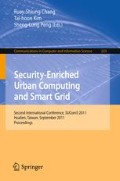Abstract
In order to enhance the relay’s performance, and use the resource efficiently, a multiple input multiple output (MIMO) relay selection scheme based on amplify-and-forward (AF) cooperative system is proposed. In this paper, we consider the diversity combining at MIMO relays, and provide a condition to maximize the overall output signal-to-noise ratio (SNR). In this condition, the ineffective relays will be excluded in sequence from the cooperation; therefore the unused relays can be reallocated to other users. In the proposed system model, we use the maximal ratio combining (MRC) at MIMO relay, and employ the best channels from each relay to the destination. Each relay transmits the signal with identical power; meanwhile, the total power allocated to the source and the selected relays is set by suboptimal distribution. Simulation results indicate that the effect of bit error rate (BER) through the relay selection is similar to the scheme which applies all relays, but the amounts of used relay decreased. And the proposed MIMO relay scheme is superior to the single input single output (SISO) one about 7dB. Therefore, the relay resource could be used more efficiently than we employ all relay. In addition, the MIMO relay scheme can enhance the relay’s performance.
Access this chapter
Tax calculation will be finalised at checkout
Purchases are for personal use only
Preview
Unable to display preview. Download preview PDF.
References
Ganwani, V., Dey, B.K., Sharma, G.V.V., Merchant, S.N., Desai, U.B.: Performance Analysis of Amplify and Forward Based Cooperative Diversity in MIMO Relay Channels. In: 69th IEEE Conference on Vehicular Technology, pp. 1–5 (2009)
Tsiftsis, T.A., Karagiannidis, G.K., Kotsopoulos, S.A., Pavlidou, F.N.: Ber Analysis of Collaborative Dual-hop Wireless Transmissions. IEE Electronic Letters 40(11) (2004)
Host-Madsen, A., Zhang, J.: Capacity Bounds and Power Allocation for Wireless Relay Channels. IEEE Transactions on Information Theory 51(6), 2020–2040 (2005)
Brown, I.D.R.: Resource Allocation for Cooperative Transmission in Wireless Networks. In: 38th Asilomar Conference on Signals, Systems and Computers, pp. 1473–1477 (November 2004)
Seddik, K.G., Ray Liu, K.J.: Outage Analysis and Optimal Power Allocation for Multinode Relay Networks. IEEE Signal Processing Letters 14(6), 377–380 (2007)
Li, Y., Vucetic, B., Zhou, Z., Dohler, M.: Distributed Adaptive Power Allocation for Wireless Relay Networks. IEEE Transactions on Wireless Communication 6(3), 948–958 (2007)
Hasna, M.O., Alouini, M.-S.: Optimal Power Allocation for Relayed Transmissions over Rayleigh-fading Channels. IEEE Transactions on Wireless Communication 3(6), 1999–2004 (2004)
Dohler, M., Gkelias, A., Aghvami, H.: Resource Allocation for FDMA-based Regenerative Multihop Links. IEEE Transactions on Wireless Communication 3(6), 1989–1993 (2004)
Annavajjala, R., Cosman, P.C., Milstein, L.B.: Statistical Channel Knowledge-based Optimum Power Allocation for Relaying Protocols in the High SNR Regime. IEEE Journal on Selected Areas in Communications 25(2), 292–305 (2007)
Hammerstrom, I., Kuhn, M., Wittneben, A.: Impact of Relay Gain Allocation on the Performance of Cooperative Diversity Networks. In: IEEE Conference on Vehicular Technology, Los Angeles, USA, pp. 1815–1819 (2004)
Wu, H., Wang, Y., Xiong, C., Yang, D.: A Novel Relay Selection Scheme with Simplified Power Allocation for Wireless Relay Networks. In: IEEE Conference on Global Telecommunications, pp. 1–5 (2009)
Brennan, D.G.: Linear Diversity Combining Techniques. IEEE 91(2), 331–356 (2003)
Laneman, J.N., Wornell, G.W.: Energy-efficient Antenna Sharing and Relaying for Wireless Networks. IEEE Conference on Wireless Communications and Networking 1, 7–12 (2000)
Proakis, J.G.: Digital Communications, 3rd edn. McGrow-Hill, Inc., New York (1995)
Author information
Authors and Affiliations
Editor information
Editors and Affiliations
Rights and permissions
Copyright information
© 2011 Springer-Verlag Berlin Heidelberg
About this paper
Cite this paper
Wu, YS. et al. (2011). MIMO Relay Selection with Suboptimal Power Allocation Transmission over Cooperative Communication Networks. In: Chang, RS., Kim, Th., Peng, SL. (eds) Security-Enriched Urban Computing and Smart Grid. SUComS 2011. Communications in Computer and Information Science, vol 223. Springer, Berlin, Heidelberg. https://doi.org/10.1007/978-3-642-23948-9_23
Download citation
DOI: https://doi.org/10.1007/978-3-642-23948-9_23
Publisher Name: Springer, Berlin, Heidelberg
Print ISBN: 978-3-642-23947-2
Online ISBN: 978-3-642-23948-9
eBook Packages: Computer ScienceComputer Science (R0)

